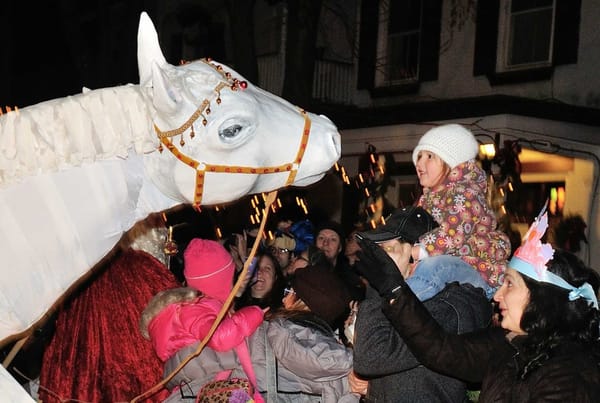Sinterklaas Canceled Again Due to Low Funds, Tariffs, and Lack of Arts Grants
After 25 years the hand-crafted holiday tradition may be gone for good.

After 25 years the hand-crafted holiday tradition may be gone for good.

It was announced this morning by festival founder and coordinator Jeanne Fleming that Sinterklaas, Rhinebeck’s eclectic handcrafted winter holiday parade and festival, will be canceled this year. She says the decision was driven by a combination of soaring costs of supplies caused by federal tariffs and a steep decline in arts funding.
“Our Sinterklaas Stars that are made in India (to benefit an orphanage) and the lights that are made in China—have nearly tripled in price, making them unaffordable for most families,” Fleming explained in a message to supporters. The light-up paper star lanterns, sold each year to raise money for the festival, traditionally brought in one-fifth of the festival’s total budget. Now, Fleming noted, the imports are not only prohibitively expensive but also face the risk of being held up in customs backlogs.
“We are also the casualty of another situation,” She writes. “Arts grants have been cut back or eliminated. We tried many different avenues all year long, but were not able to get the final amount of money to make it happen.”
For more than 25 years, Sinterklaas transformed Rhinebeck each December into a storybook scene. Rooted in the old Dutch tradition of honoring St. Nicholas, the festival reimagined the saint’s arrival in the Hudson Valley creating its own local iconography and magic. Children were crowned kings and queens, streets filled with giant paper puppets and performers as the parade illuminated the village with giant stars, fantastical animal figures, and music.
“The storytelling, the laughter, the music, the drama, the silliness and fun. It has been the greatest joy of my life to have lived and worked with this extraordinary group of generous souls in this wonderful community to truly allow magic to happen,” Fleming reflects in her farewell.
The festival relied on the efforts of hundreds of artists and nearly a thousand volunteers, as well as a year-round core committee that raised money, secured permits, and managed the logistics of an event that drew tens of thousands of visitors.
This is not the first time Sinterklaas has faced financial peril. The event was canceled last year as well, with organizers citing dwindling financial support, a deficit too large to cover, and the loss of key volunteers. Fleming herself warned then that without a major infusion of support the festival’s future was uncertain.
While Fleming and company endeavored to revive the tradition again, this year’s cancellation highlights broader forces beyond local capacity. Fleming emphasizes that tariffs created a blockade to one of the festival’s main funding sources, saying that families could no longer be expected to absorb the increase. “It is hard to believe that something as unique and beloved as Sinterklaas could fall casualty to lack of money, but that is the case,” Fleming says.
She says that her team had pursued “many different avenues all year long” in search of a solution, but “our last hope of saving the event fell through and so, we have to cancel.”
Fleming assures that donations received for 2025 would be refunded within the next two weeks.